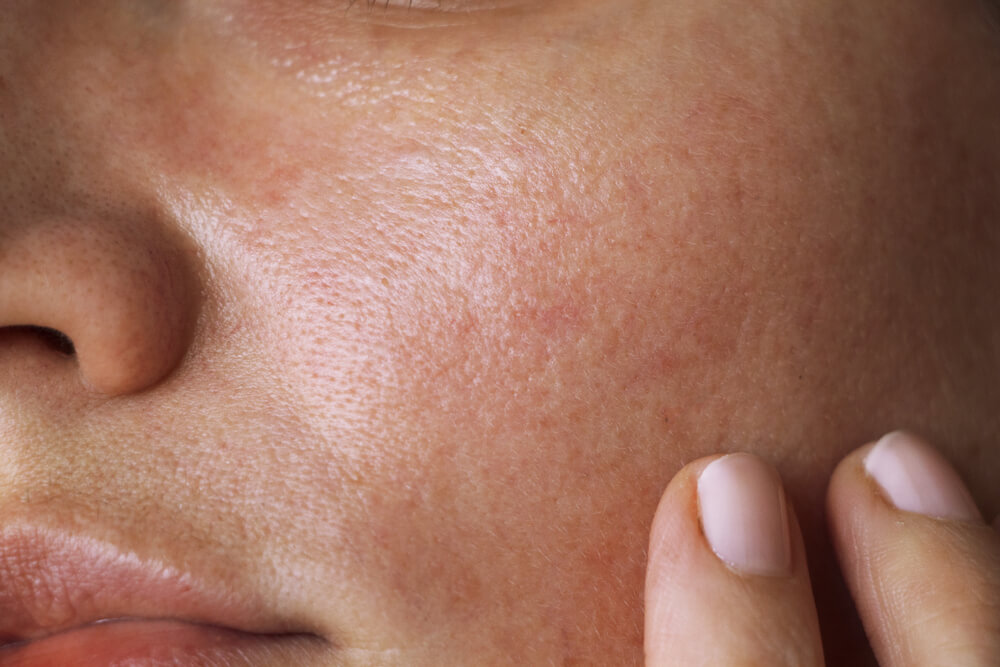Why Psychodermatology Is The Real Key To Better Skin

When your skin’s acting out, it’s hard not to stress over it! But, since stress is often the reason your skin is aggravated, you can see how it can quickly turn into a vicious cycle.
Don’t panic, it doesn’t end here (phew) as this is where the newly-coined term, psychodermatology, comes in to help. If you’re thinking psycho-derma-what? Well, psychodermatology is a relatively new practice that assesses the interaction between your skin and your mental well-being, offering a more holistic and all-encompassing approach to solving skin concerns. Essentially, it combines advanced dermatological treatments with psychological support. This not only helps manage treatment but also helps with the mental side-effects chronic skin conditions can have.
So, instead of just offering a cream, a visit to a psychodermatologist will delve deeper by using psychological and psychiatric techniques to understand the causes of skin issues from beyond the epidermis. As a result, they’ll be able to reach a long-term solution rather than a band-aid fix. For the 411, we spoke to dermatologist and skin wellness expert, psychodermatologist Dr. Alia Ahmed, whose vast background includes dermatology, psychology, and clinical psychology. Here’s what we learned…
What is psychodermatology?
According to Dr. Ahmed, “Psychodermatology is the part of dermatology that considers both the mind and the skin together when seeing a person with a skin problem. As a dermatologist, I know that my patients are at higher risk of developing poor psychological health, meaning they are more likely to feel embarrassed, low, anxious, have body image issues and feel socially isolated. These feelings can then impact their skin and it can turn into a vicious cycle.”
Psychodermatology helps to treat the psychological impact as well as the skin condition. Dr. Ahmed gives an example: “Someone with acne may be feeling anxious about being in a social environment because of their skin, so in addition to treating their acne, I will discuss techniques they can use to overcome these feelings and empower them to do the things they want.” Not only is this empowering, but by lowering the stress created by these situations, this too will have a positive impact on the skin by lowering cortisol levels.
 Source: Dmytro Zinkevych/Shutterstock
Source: Dmytro Zinkevych/Shutterstock
Psychodermatology also helps to address all areas of your life, and Dr. Ahmed says, “I also assess the person as a whole, we talk at length about their lifestyle, skincare regimes, work and study environment, as well as relationships. Very few people realize how reactive their skin is to lifestyle choices.”
Why pyschodermatology is SO important
We all know the impact a ‘good’ or a ‘bad’ skin day can be on our mood, and with the rise of wellness awareness, pyschodermatology is becoming increasingly important. Dr. Ahmed revealed: “There is a growing voice from our patients telling us that their skin is impacting the way they feel and vice versa. In fact, 85% of dermatology patients feel that psychosocial factors are a major component of their illness, and 17% need support to cope with their condition.” Stress can also play a role in the success of the treatment, therefore, Dr. Ahmed outlines; “Psychological distress also has an impact on the outcome of treatment. There is evidence to show that addressing psychological factors can improve skin conditions.”
A first-hand example of psychodermatology success: NY dermatologist Dr. Doris Day tells a story in her book Beyond Beautiful about a woman named Selma who had psoriasis. Although the condition was kept under control with prescription creams, it would flare-up terribly at the same time every year (at one point she was hospitalized). Dr. Day asked Selma what was going on at this time of year, the woman told Dr. Day that it was the anniversary of her son’s death, and that “every day was a struggle, but the month of his passing was unbearable.” Following this revelation, Dr. Day involved the proper multidisciplinary team, which included grief counselors and connecting her with support groups to help her. The following year, Dr. Day helped Selma celebrate the memory of her son in the months prior to his passing. Combined with the other care Selma received, it helped her to avoid a flare-up that year, while also gradually improving her condition entirely.
How your mental wellbeing affects your skin
 Source: Geinz Angelina/Shutterstock
Source: Geinz Angelina/Shutterstock
Your mental wellbeing and the state of your skin are intrinsically linked. Just think back to the last time you were super stressed, chances are your skin was acting out too. Dr. Ahmed explains why: “I often say to my patients ‘stress causes skin disease and skin disease causes stress.’ Feelings of emotional distress lead to the release of a stress hormone (cortisol), which is known to affect the immune system (making the skin less able to defend itself), drive allergic responses, delay healing, and disrupt the skin’s natural barrier.
“The effects seen on the skin can vary, including feeling red, dry and itchy, as well as the formation of lines, wrinkles, pigmentation, signs of premature aging and dull skin. The role of stress is well known to cause or drive skin conditions like eczema, psoriasis, alopecia areata, urticaria, acne, and skin tumors.”
According to Dr. Ahmed, “30% of people with skin disease have high levels of psychological distress. Acne is associated with an increased risk of anxiety and depression… People with acne also have more appearance-related distress and self-conscious thoughts.” While she describes similar feelings for people with psoriasis and eczema. Dr. Ahmed says, “These feelings may have developed because of having a chronic skin condition, and are directly related to psychological distress.”
What skin concerns can psychodermatology help address?
Psychodermatology can be used to address a wide array of skin concerns, plus the emotional impact they may have. “The patients I see include those with chronic skin diseases like acne, rosacea, vitiligo, which have a psychological impact such as low self-esteem, body confidence, anxiety, and depression. As well as those conditions that are impacted by stress like eczema, psoriasis, urticaria to mention a few!” states Dr. Ahmed.
Posts You'll Love:
What sort of treatments are recommended in psychodermatology?
According to Dr. Ahmed, the first step is to “Correctly diagnose and treat the skin problem that my patients present with. This can include topical treatment (creams), oral and injectable medications, or other physical treatments (e.g. phototherapy).”
Once treatment is provided to soothe the skin concern, Dr. Ahmed will address a number of other variables: “I also discuss the skin-care regime people are using and adjust this according to the skin problem they have.”
Then, Dr. Ahmed will take a more holistic approach. “I spend a lot of time asking my patients how their skin impacts their daily life (e.g. mood/sleep/work/relationships) and working out how they cope with this. If I can see that they are not coping well, then I will make suggestions based on their needs. For example, adjunctive treatments, which include relaxation therapies, mindfulness, and other cognitive-behavioral therapies.”
In case you’re wondering what an appointment with a psychodermatologist might include, Dr. Ahmed says that some of the questions she typically asks in a consultation include: Are you able to concentrate? Is your sleep affected? Do you feel low in mood? Do you feel tearful or anxious? Does your skin stop you from doing the things you want to in life? Are your relationships/physical relationships affected by your skin? Is your social life affected by your skin?
Then, Dr. Ahmed will customize a plan based on the patient’s needs and capabilities “I work closely with patients to address these [lifestyle] choices in ways that are acceptable to them, that way they are more likely to make positive changes! Most people do not realize the impact of psychological health on the skin, psychodermatology empowers patients to recognize and manage psychosocial factors at the same time as treating their skin condition.”
In more serious cases, Dr. Ahmed says, “Where psychological distress is severe, I will treat this with mood or anxiety-managing medications.”
5 Wellness Tips For Healthier Skin
Evidently, healthy skin goes far beyond a good skincare regime, Dr. Ahmed reminds us, “Lifestyle choices can impact skin health, so it’s important to consider the amount of sleep people are getting, their daily fluid intake, food choices, and amount spent exercising.” We asked Dr. Ahmed for her key wellness tips to promote healthier skin and a positive mindset. Here’s what she told us:
1. Make sleep a priority
 via Giphy
via Giphy
“I usually suggest regimes for sleep hygiene (i.e. pre-sleep activities, regular bed-time, switching off from any digital devices one hour before bed, and natural sleep adjuncts like melatonin). The skin has a natural rhythm and many skin-repairing processes happen overnight, without adequate rest these cannot happen effectively. Help your skin help itself!”
2. Drink 2 liters of fluid
 via Giphy
via Giphy
“Drink at least two liters of fluid a day – maintaining hydration is so important and strengthens the skin barrier. A lot of the time dehydrated skin is treated with greasy moisturizers, and this can aggravate skin problems in some people. Address natural hydration first!”
3. Consider your gut health
 via Giphy
via Giphy
“The interaction between the gut, brain, and skin should not be forgotten when assessing skin health. The natural balance of the gut can be skewed by lifestyle factors and stress, this, in turn, can promote inflammation, which is implicated in skin conditions. Take some time to consider if your diet is working well for your body, incorporate some healthy choices and consider a probiotic supplement to move things in the right direction!” For more tips on how to improve your gut health, read this.
4. Wear sunscreen
 via Giphy
via Giphy
Whenever we interview a dermatologist, without fail, they will ALL mention the importance of wearing sunscreen daily. Dr. Ahmed says the same; “UV rays from the sun can also induce the stress response in the skin to cause photo-damage. So stop smoking and use sunscreen!” For more SPF tips and advice, check out this post.
5. Quit smoking
 via Giphy
via Giphy
We all know the negative effects of smoking but Dr. Ahmed reminds us to; “Limit factors that cause premature aging – smoking causes skin damage that leads to signs of aging, like lines, wrinkles, and pigmentation.”
How to find a psychodermatologist
Possibly the easiest way to find a psychodermatologist is to ask your dermatologist for a referral. Although, Dr. Ahmed did say “There are very few dedicated psychodermatology clinics in the UK.” However, if you’re based in the UK you can access a psychodermatologist both on the NHS and in the private sector. If you’re living elsewhere lookup wellness and dermatology practices.
For more wellness tips, check out our five tips to have the best day ever!




















Leave a comment